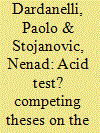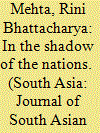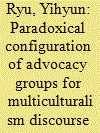| Srl | Item |
| 1 |
ID:
104114


|
|
|
|
|
| Publication |
2011.
|
| Summary/Abstract |
This article deals with the connection between nationality and democracy and explores the role Switzerland plays in the scholarly debate on this question. It identifies three main theses - liberal-nationalist, liberal-multinationalist and liberal-postnationalist - and shows that each of them uses the Swiss case to claim empirical support. It then analyses the connections between nationality and democracy in Switzerland and demonstrates that the country is neither multinational nor postnational, but is best characterised as a mononational state. These findings expose the fallacy of using Switzerland to claim support for either the multinational or the postnational thesis and call for a reconsideration of them. Additionally, they show that "civic nationalism" and "civic republicanism" can be conflated and that a predominantly civic nation is viable and sustainable and is not necessarily an ethnic nation in disguise. The Swiss case thus provides qualified empirical support for the liberal-nationalist thesis.
|
|
|
|
|
|
|
|
|
|
|
|
|
|
|
|
| 2 |
ID:
110866


|
|
|
|
|
| Publication |
2012.
|
| Summary/Abstract |
This essay revisits the political persona of Rabindranath Tagore (1861-1941) in the period following his receiving the Nobel Prize in Literature in 1913. While Tagore's political voice in Bengal and India had already been radicalised in 1908 with his unequivocal rejection of British imperialism and militant Indian nationalism, he would formulate his mature critique of the 'nation' only during his post-Nobel visit to Japan and the United States in 1916. To the reader who could access Tagore's works only in English translation, there is a world of difference between the poet of The Gitanjali and the author of Nationalism. This essay revisits the contexts of that difference.
|
|
|
|
|
|
|
|
|
|
|
|
|
|
|
|
| 3 |
ID:
187165


|
|
|
|
|
| Summary/Abstract |
This article demonstrates that the paradoxical configuration of groups supporting multiculturalism in South Korea stems from uniquely Korean experiences of colonialism, territorial division, and modernization. Unlike other societies, conservative political force advocates for multiculturalism and blames nationalism for its intolerance. On the other hand, its political counterparts have lingered on Korean nationalism, often presented as an antipode of multiculturalism. For exploring the antecedents of South Korean multiculturalism that contributed to shaping such configuration, I use the Foucauldian theoretical concept of governmentality and genealogy. Governmentality focuses on the conditions or circumstances under which policy problems are produced and genealogy allows us to trace back to its origin of the discourse, for de-familiarizing and dismantling the widespread perception of South Korean multiculturalism. This article explores how historical and geopolitical conditions have shaped engagement with multiculturalism discourse and how the emergence of post-nationalism laid the foundation for multiculturalism policy.
|
|
|
|
|
|
|
|
|
|
|
|
|
|
|
|